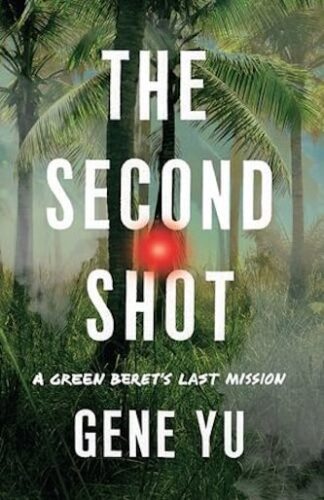Book Review: “The Second Shot” — An Incomplete Story
By Clark Bouwman
This memoir is, in part, Gene Yu’s effort to give credit where credit is due for his rescue of a woman kidnapped by the Jihadist terrorist group Abu Sayyaf.
The Second Shot: A Green Beret’s Last Mission by Gene Yu. Little A, 228 pages, $28.99.
 On the night of November 13, 2013, a Taiwanese factory manager named Evelyn Chang was kidnapped from her vacation cottage in Malaysian Borneo by members of the Jihadist terrorist group Abu Sayyaf. Chang was held for ransom on a remote island in the southern Philippines for 35 days. Gene Yu, an American graduate of West Point and former Green Beret, is the man credited with rescuing Chang from her ordeal. The Second Shot is Yu’s candid account of his role in the rescue mission and a memoir of his life prior to the event.
On the night of November 13, 2013, a Taiwanese factory manager named Evelyn Chang was kidnapped from her vacation cottage in Malaysian Borneo by members of the Jihadist terrorist group Abu Sayyaf. Chang was held for ransom on a remote island in the southern Philippines for 35 days. Gene Yu, an American graduate of West Point and former Green Beret, is the man credited with rescuing Chang from her ordeal. The Second Shot is Yu’s candid account of his role in the rescue mission and a memoir of his life prior to the event.
From their beginning, efforts to rescue Chang were complicated by Chang’s Taiwanese citizenship, reinforced by the country’s lack of formal diplomatic relations with the Philippines and other countries in the region. The mission Yu organized was therefore necessarily a private one; there was no official support from the government of the Philippines, the U.S. or any other state entity. Somehow, Yu was able to convince a number of key figures in the Philippines’ military and intelligence services to embark on this project as individuals — at great risk to their careers as well as to their personal safety. By prior agreement, Yu accepted disproportionate kudos for the rescue; that way press attention would be deflected from the role played by the Filipinos. This memoir is, in part, Gene Yu’s effort to give credit where credit is due.
Yu spends the first half of The Second Shot sketching the pre-rescue events of his life. He goes over his upbringing in New England and Silicon Valley as the American-born son of a striving immigrant couple from Taiwan, his education at West Point, and his military and private career prior to the mission. Yu’s account of growing up in the U.S. is touched with the inevitable pathos of the eternal outsider; a child born in the cradle of the American revolution, but also somehow “born a foreigner” in the eyes of his fellow citizens.
That said, chronology isn’t always handled effectively in The Second Shot, particularly when the looping, recursive structure of memoir gives way to the story of the Chang rescue mission. Yu interrupts his account of the early planning of the extrication to describe the successful release of a kidnapped child in Iraq years earlier. Predictably, this backstory disperses narrative energy as it causes unnecessary reader whiplash. In fact, we learn about Yu’s four tours in Iraq through this and similarly oblique references to the lessons served up by the previous experience. Such an important chapter of Yu’s career deserves its own place in the narrative of his life.
Another disappointing aspect of The Second Shot is the scarcity of information about Evelyn Chang herself, particularly following her rescue. Yu is admirably candid in acknowledging the ways in which the mission benefitted him – spiritually, psychologically, and businesswise. The fame he reaped from the successful undertaking helped him launch the cybersecurity firm he now runs. Beyond acknowledging that Chang had a difficult time recovering from the psychic trauma of her ordeal, he tells us nothing of her life after she was liberated.
The phrase “The Second Shot” is taken from U.S. army sniper training. After the sniper’s first attempt, a “spotter” immediately adjusts the rifle’s elevation and trajectory based on where the first shot missed. Yu uses the phrase as a metaphor for a recurring pattern in his life — initial failure, followed by recovery, adjustment, and eventual success. Perhaps, a historian, journalist, Yu himself, will benefit in a similar way from this first shot at the story of Evelyn Chang’s abduction and rescue.
Clark Bouwman is a poet, essayist, and translator whose work has appeared in Gargoyle Online, Feral, The Dreaming Machine, The Antonym, and in the anthology Music Gigs Gone Wrong. Originally from the DC area, he and his wife moved to the San Francisco bay area in 2018 to help with their grandchildren.

